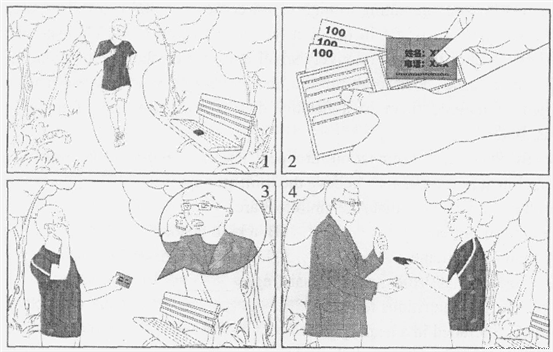题目内容
My husband hasn't stopped laughing about a funny thing that happened to me. It's funny now but it wasn't at the time.
Last Friday, after doing all the family shopping in town, I wanted a rest before catching the train, so I bought a newspaper and some chocolate and went into the station coffee shop - that was a cheap self-service place with long tables to sit at. I put my heavy bag down on the floor, put the newspaper and chocolate on the table to keep a place, and went to get a cup of coffee.
When I went back with the coffee, there was someone in the next seat. It was one of those wild-looking youngsters, with dark glasses and worn clothes, and hair colored bright red at the front. Not so unusual these days. What did surprise me was that he'd started to eat my chocolate!
Naturally, I was annoyed. However, to avoid trouble - and really I was rather uneasy about him - I just looked down at the front page of the newspaper, tasted my coffee and took a bit of chocolate. The boy looked at me closely. Then he took a second piece of my chocolate. I could hardly believe it. Still I didn't dare to start an argument. When he took a third piece, I felt more angry than uneasy. I thought, "Well, I shall have the last piece." And I got it.
The boy gave me a strange look, and then stood up. As he left he shouted out. "This woman's crazy!" Everyone stared. That was embarrassing enough, but it was worse when I finished my coffee and got ready to leave. My face went red - as red as his hair - when I realized I'd made a mistake. It wasn't my chocolate that he'd been taking. There was mine, unopened, just under my newspaper.
1.The woman telling the story ________.
A. always went shopping with her family on Fridays
B. had been very busy and needed some time to recover
C. bought some chocolate so that she could keep a place at the table
D. wanted a newspaper and some chocolate to take home to her family
2.When the woman saw the boy go on eating the chocolate, she felt ________.
A. too tired to start an argument
B. more and more angry with the boy
C. too shy to look in the boy's direction
D. more and more disappointed at losing the chocolate
3.The woman's face turned red ________.
A. because she hated being shouted at
B. because she saw everyone staring at her
C. because she realized that the boy was poor and angry
D. because she realized that she had been quite wrong about the boy
4.From the story we can see the woman ________.
A. was crazy
B. was being careless
C. often made mistakes
D. was careless and selfish
 红果子三级测试卷系列答案
红果子三级测试卷系列答案 课堂练加测系列答案
课堂练加测系列答案

